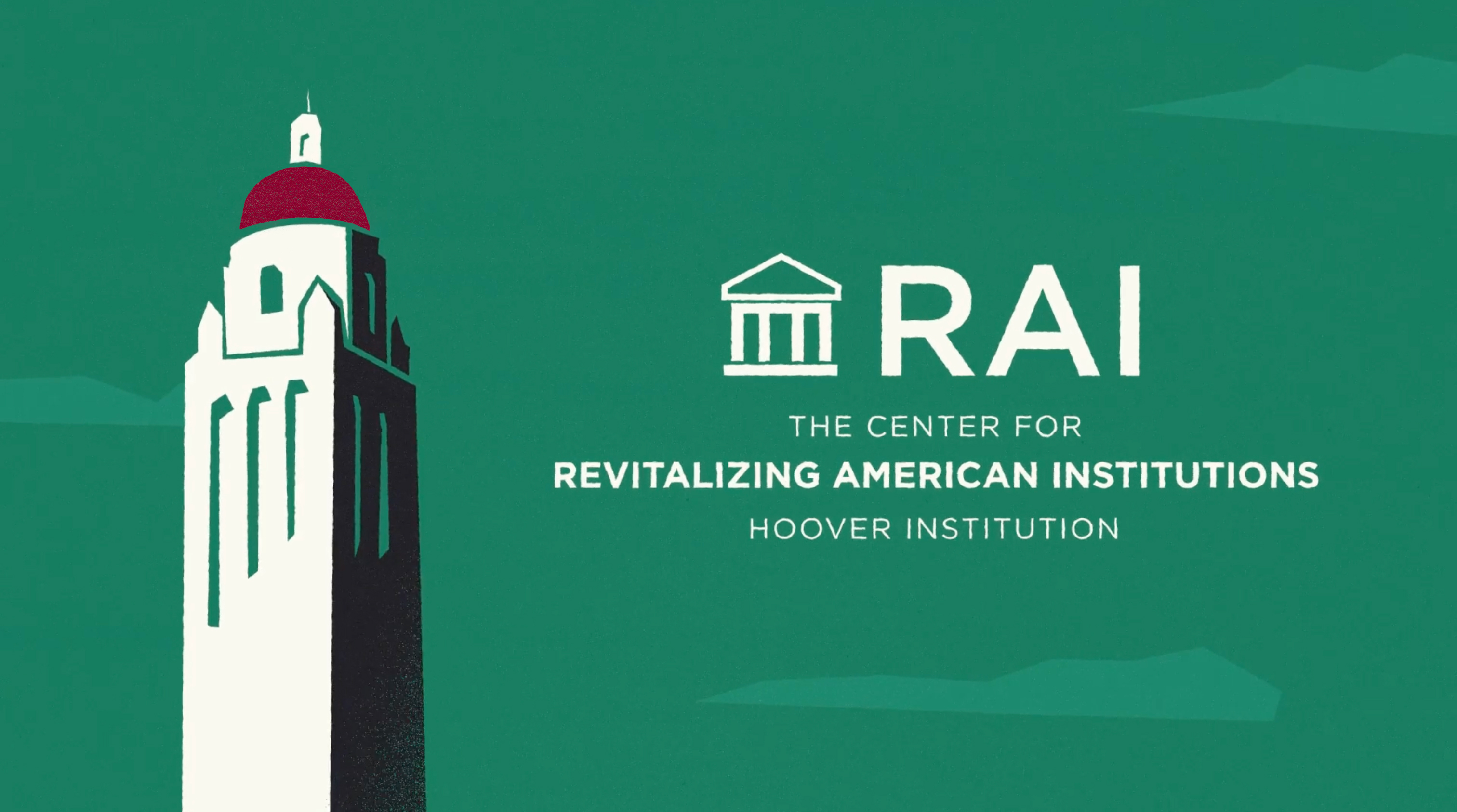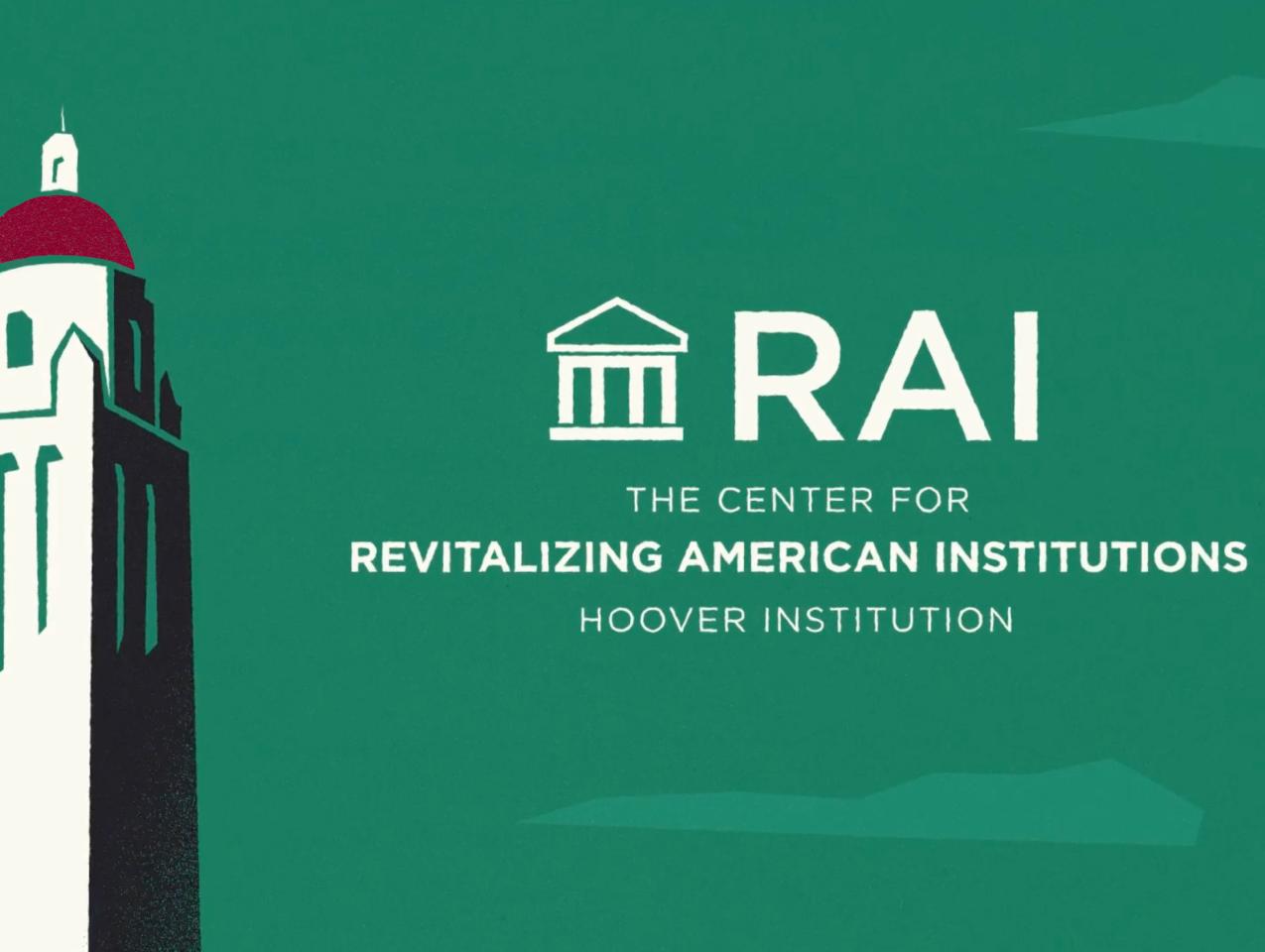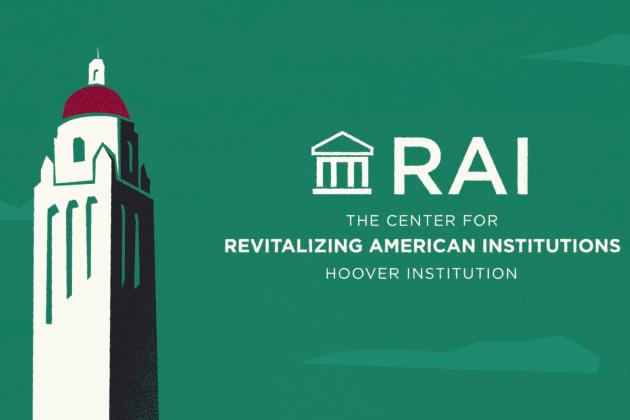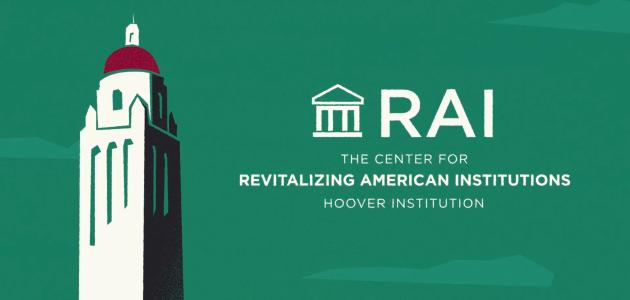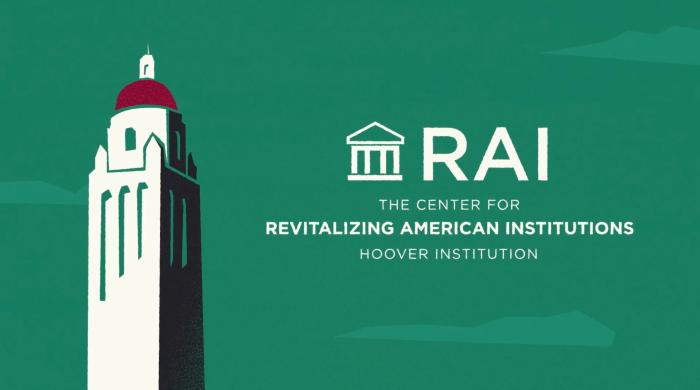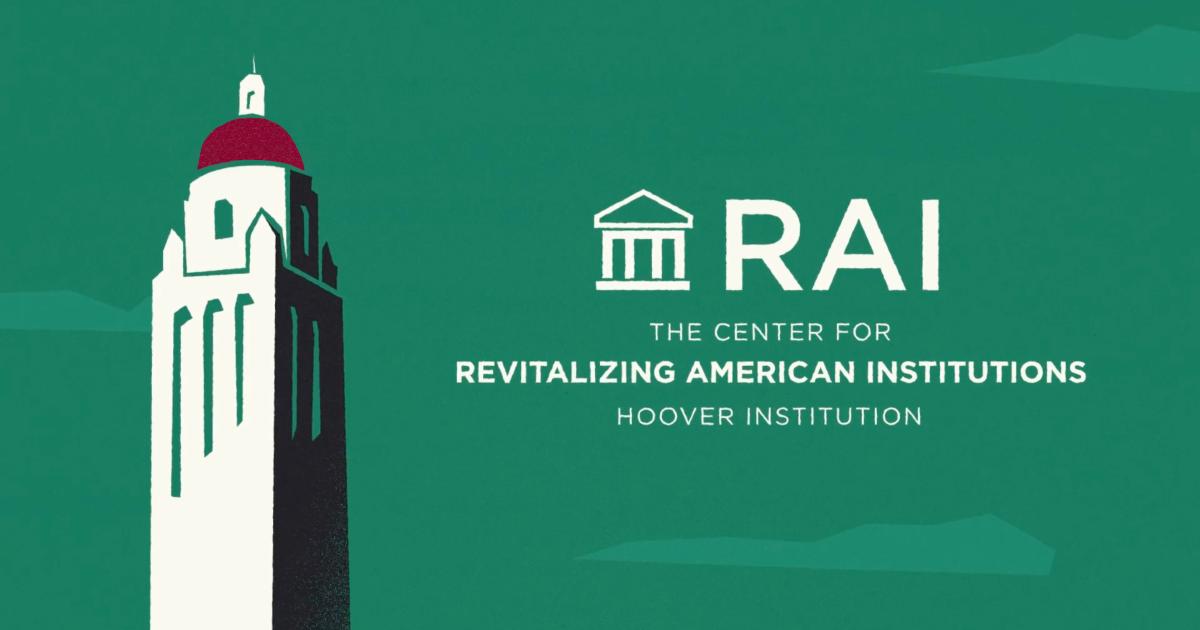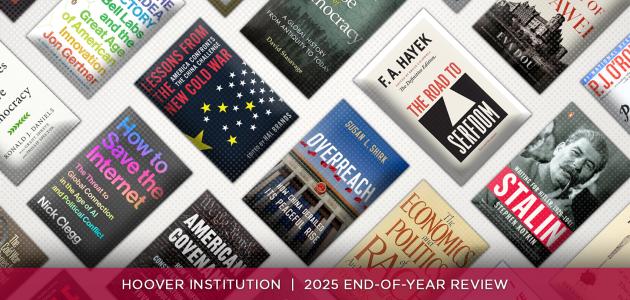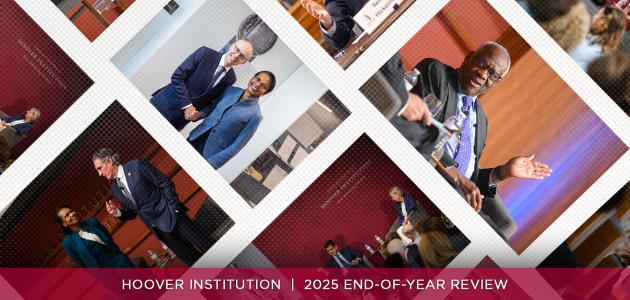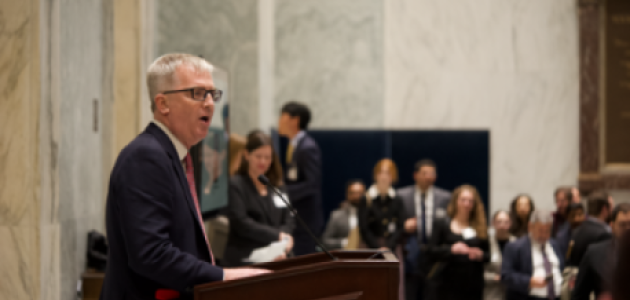In the March 2025 edition of Inside RAI, The Center for Revitalizing American Institutions released a limited podcast series on civics education and hosted a daylong conference at Hoover on the same topic. The conference featured a discussion involving Gen. Jim Mattis, who urged more young Americans to consider a life in the armed forces but also implored them to know their history and the workings of the government before they join. Also, Eugene Volokh and Free Speech Unmuted cohost Jane Bambauer explored the Mahmoud Khalil deportation case, asking if noncitizens can be deported for their speech.
Governmental Institutions

The Name Game: Mount Denali vs. Mount McKinley
How to Label Public Places
On his Substack, The Modern Federalist, Senior Fellow Paul E. Peterson writes about recent decisions by the Trump administration to rename landmarks, pointing out there is already an existing guide for how to name places of significance within the United States. Known as the Board on Geographic Names, a group of representatives from different US federal agencies has been guiding the naming of public places since 1890. Peterson cites four guiding principles from the Board on Geographic Names that could guide naming concerns today.
One of them allows for dual naming of a place if it has significance to different cultures with distinct languages, such as Mount McKinley (or Denali) in Alaska. “We do not need a battle over McKinley and Denali or in other instances where dual cultural traditions treasure the same geographical landmark,” he writes. Granting states the option of naming their own landmarks is just another gift of federalism, Peterson writes.
Read more here.
Organizations and Democratic Practice

Can Noncitizens Be Deported for Their Speech?
On the latest episode of Free Speech Unmuted, Senior Fellow Eugene Volokh and cohost Jane Bambauer ask under what circumstances the First Amendment protects the speech of noncitizens in the United States. They explore the recent case of a former Columbia University graduate student who holds a green card but was detained by Immigration and Customs Enforcement (ICE), possibly due to his participation in pro-Hamas protests on the campus. Noncitizens who commit crimes can of course be detained by ICE, but when it comes to speech, the grounds for removal are smaller, according to the law. Volokh says “endorsing or espousing terrorist activity” or persuading others to do so can result in removal. The secretary of state has wide latitude in determining what qualifies as an endorsement of terrorism, Volokh says.
But in introducing this as a power to be wielded by the secretary of state during this administration, Volokh says there will be a negative effect on public discourse at schools and universities. “Because, remember, this doesn’t just apply to people chanting slogans at encampments, including often illegal encampments. Somebody could be deported under the statute for having a serious, thoughtful conversation about political violence,” Volokh says.
Listen to the episode here.

New Paper Suggests July 2024 Attempt on Trump’s Life Lowered Public Support for Public Violence
In a paper published in PNAS in November 2024, Visiting Fellow Sean Westwood and coauthors examined representative sample polls before and after the July 13, 2024, attempt on Donald Trump’s life. They found the attack in Butler, Pennsylvania, caused Republicans to eschew political violence, and the event did not increase support for violence against one another. “Using panel and cross-sectional interrupted time series analysis, we find no evidence that the event increased tensions or support for retaliatory violence in the immediate aftermath,” the authors write. “On the contrary, Republicans, including MAGA Republicans, became significantly less supportive of partisan violence against Democrats.”
Read the paper here.
Democratic Citizenship

Gen. Jim Mattis on Civics and Unity in the Military
At the iCivics National Forum hosted at the Hoover Institution on March 13, Distinguished Fellow Gen. Jim Mattis was asked to speak about the value of civic knowledge and understanding from the perspective of someone serving in the US armed forces. His answer spoke to the unique value of civics for the warfighter and the need not only for more young people to serve their country, but for those young people to fully understand the need to serve.
Excerpts from his response:
"If you want your democracy to be defended but not policed by our military, civics is absolutely essential. It starts on the very first day, when you swear to support and defend the Constitution. And then there’s your first day at boot camp. I still remember watching as the clock took forty seconds to give me a haircut that would make even President Kim of North Korea look like a well-coiffed man. And as I was watching that, I noticed some pictures on the wall. There was the president. Makes sense; he has something to do with the military. The elected commander in chief. Then there was the secretary of defense. I was in the Marines, so there was the secretary of the Navy, too, and they’re all wearing suits.
And underneath it were pictures of the four-star commandant of the Marine Corps, the commanding general of the base, and the colonel who commanded the unit that I was reporting to for Officer Candidate School. So right away, you’re getting an education in the military.
It’s more of a work-study program than a study-work program, and it has to do with the survival of this great big experiment we call America. I would tell you, too, that there’s a sense that we have no ordained right to this democracy. That’s drilled into you.
In other words, if you want this democracy to survive—it’s assumed that it’s valuable to everybody who’s there—then you’re going to have to be very good at your job."
Read more here.
Videos from the March 13 gathering will be available soon.

Renewing Civics Education—Preparing for American Citizenship
In a new limited podcast series, Senior Fellow Chester E. “Checker” Finn Jr. interviewed scholars and experts about the challenges of citizenship education, why it matters, and how civics education needs to change in the 21st century.
Here is an outline of the episodes:
- A conversation between Distinguished Policy Fellow Bill Whalen and Checker Finn examined how US educators can improve civics instruction at the K–12 and collegiate levels.
- Focusing on civics at the K–12 level, Finn spoke with Senior Fellow Paul E. Peterson about his experiences teaching an introductory government course and his thoughts on related topics including education reform, school choice, and standardized testing.
- Examining the difference between instilling American patriotism and indoctrination, Senior Fellow Peter Berkowitz joined Finn to talk about the reforms he believes are necessary elements of civics education, not just in college but also in high school.
- What do best practices of civics instruction at the undergraduate level look like? Senior Fellow Josiah Ober, who leads the Stanford Civics Initiative and co-leads the new Alliance for Civics in the Academy, joined Finn to talk about his roadmap for improving civics instruction.
- Contending with the decline of trust in news media and its impact on civic knowledge and participation, Nick Mastronardi, a Hoover Institution veteran fellow (cohort of 2021-22) and software innovator in the field of public-sector communications, discussed advances in data collection and artificial intelligence and how they can positively affect government behavior and civic interaction.
Find all 5 episodes here.
Upcoming Events:
How Foreign Speech Restrictions Affect American Free Expression, April 30, 2025, from 10:00 ‒ 11:00 am PT.
Building Strategic Competence: An Urgent Priority for Government and the Academy, May 7, 2025 from 10:00 ‒ 11:00 am PT.







